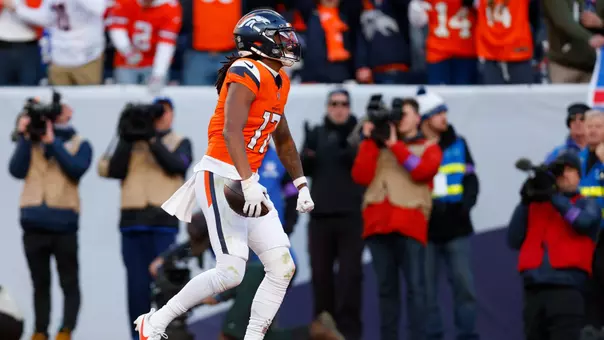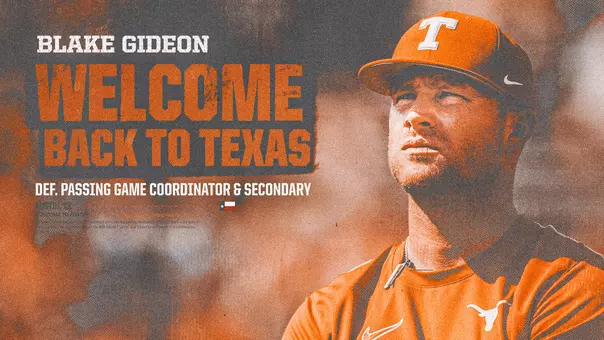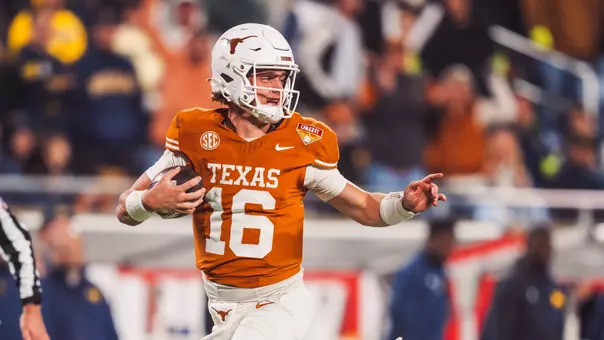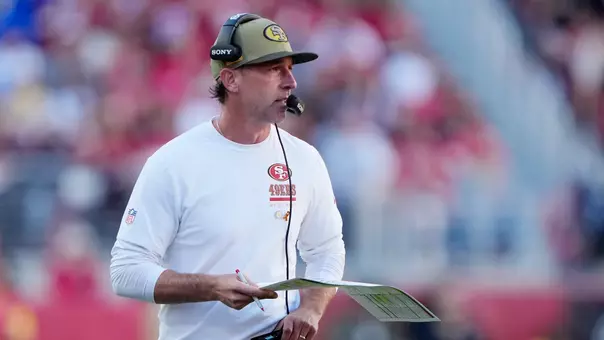The University of Texas at Austin Athletics
Bill Little commentary: Almost heaven
11.10.2013 | Football, Bill Little Commentary
Ever since West Virginia entered the Big 12, the aura of a night game in the mountains has stood as a benchmark for what the college football experience should be.
MORGANTOWN, W.Va. -- If you love the game, you had to embrace the night.
College football is not, nor will it ever be, flawless. It is a game played by young people, and it is perfect only in its imperfection. The pages of Longhorns history are filled with great games that are remembered because, in one shining moment or another, Texas overcame adversity and triumphed -- games where the spirit conquered the odds; where will superseded what seemed the inevitable.
Saturday evening in Morgantown was one of those moments.
Ever since West Virginia entered the Big 12, the aura of a night game in the mountains has stood as a benchmark for what the college football experience should be. When the big screen in the stadium darkens as night comes in the Southern Appalachian Mountains where the Monongahela flows toward the Ohio, you are welcomed to the ominous coming of a "Night Game" to Milan Puskar Stadium.
And they came, almost 60,000 of them, to see Texas play their beloved Mountaineers. But a funny thing happened as the Longhorns got their first taste of a road game in West Virginia -- they found a passionate fan base that, for the most part, included good God-fearing people who were there to cheer for their team, rather than to simply cheer against Texas.
Saturday night in Morgantown, Texas found a cradle of folks who embrace the game, love their state, and cheer loud and long for their team. The fiber of the people and the rich heritage of the land -- that space where the history of the mountains far outdates football and rivalries -- overrides the few who are prone to be rude. This is a place where the Mountaineers mascot sought out Nate Boyer after the Texas Green Beret deep snapper carried the flag on the field to thank him for his service to America.
In the midst of that setting, after a first half that neither team would be proud of, a second half of college football for the ages emerged. Lackluster statistics and mistakes gave way to a serve-and-volley, lead-swapping game where big plays countered big plays until it ended with a 47-40 win for Texas in Mack Brown's first-ever overtime game.
It was, after all, a triumph of positive energy. Down 19-13 at halftime, Texas would trail 26-16 with only a quarter and 7:26 of the third quarter remaining. Before that third quarter ended, Texas had taken a 30-26 lead. But the zaniness of the evening was only the beginning. West Virginia took a 33-30 lead with barely a minute gone in the fourth quarter. Texas answered with an 11-play drive that ate almost five minutes off the clock and led, 37-33.
Three plays later, the Mountaineers connected on a 72-yard touchdown pass against an all-out blitz and it was 40-37, West Virginia. The "serve break," to use a tennis term, came on the next two series. Texas went three-and-out and with less than three minutes remaining, the UT defense stopped the Mountaineers on a crucial third-and-one and forced a bad punt. With only 2:35 remaining, Case McCoy and his Longhorns offense were in a familiar position. They had to come from behind.
McCoy had become part of Longhorns lore when he led his team a to a game-winning field goal against Texas A&M in College Station in 2011. He had come off the bench and rallied the Horns to a season-saving victory over Kansas in Lawrence last year. This season, he had driven Texas the length of the field and scored on a quarterback sneak to beat Iowa State in Ames.
Now here was Texas, at its own 36-yard line trailing by three points at 40-37. Working with co-offensive coordinator and play caller Major Applewhite, Texas and McCoy used the running and pass receiving of Malcolm Brown to drive to the West Virginia 47-yard line. In pregame, kicker Anthony Fera had had the distance heading toward the north goal from the opponent 40. His longest kick has been 50. But none of that mattered when McCoy's second and third down passes went incomplete.
It was fourth down. Fifty-nine seconds remained in regulation. Texas called timeout.
Watching on television more than 1,000 miles away, a learned, veteran college coach saw something he liked. While other coaches may appear tense and tend to be stern and rant in that moment, Mack Brown was laughing.
"I will tell you this," said the observer. "Texas won that game because of Mack Brown. The team reflected his positive attitude."
Facing fourth and seven, he looked at his senior quarterback and laughed.
"You're going to do this again," he said smiling.
And Case McCoy went out and threw a pass to Jaxon Shipley -- just as he has done thousands of times since the two great friends were kids together, Case in the fourth grade at Jim Ned and Jaxon in the third grade in Rotan. Nine yards later, Shipley had a first down and the Longhorns had new life.
Applewhite came with perhaps the play call of the game on the next play, when Malcolm Brown broke for 27 yards to the Mountaineer 11-yard-line to set up Fera for a game-tying field goal that knotted the score that forced overtime with the score 40-40.
West Virginia won the flip and chose to play defense to start the overtime. Again, it was Malcolm Brown and McCoy with some deft play calling negotiating the 25 yards to score. McCoy's 14-yard pass to Marcus Johnson carried for a first down to the West Virginia 11. The Horns took the lead on McCoy's two-yard TD pass on yet another third down play, this time to fullback Alex De La Torre, who caught the first pass of his career in what turned out to be the game-winning TD as the Longhorns led, 47-40.
Still, it would be up to the defense to seal the deal.
Greg Robinson's crew had been sensational for much of the game, but hadn't been able to stop the inspired Mountaineers in the midst of the lead-swapping in the second half. On the first play, West Virginia gained 20 yards to the UT five.
Legend has it that more than 40 years ago, in an epic game against Arkansas when the Longhorns had to have a stop and the Razorbacks were inside the five, all-American linebacker Johnny Treadwell is said to have said "Now we've got 'em right where we want 'em."
And so it was with Texas, 2013.
On the first play, running back Charles Sims gained a yard to the four. On the second, Quandre Diggs knocked away a pass. Steve Edmond did the same on third down. It had come down to one play.
Since Greg Robinson came to Texas following the BYU game, Steve Edmond had been a special project. He saw something he liked, and under his tutelage, the Longhorns have blossomed. The packed crowd held its breath. On the Longhorn bench, Case McCoy knelt, prepared if needed to go back on offense if the Mountaineers scored.
And Steve Edmond picked off the last pass of the game.
Texas players rushed the field. At the distant end, the Longhorn Band played and the loyal UT contingent cheered. The crowd, now silent, stood respectfully as Mack Brown and Dana Holgorsen met and TV cameras converged on Texas.
As the teams mingled with each other, a West Virginia player stood alone near the 30-yard line at the north end of the field. To nobody in particular, he simply said, "Awh…man."
In the Longhorns locker room, Texas surrounded its injured stars Jonathan Gray and Chris Whaley, and began a chant that simply said, "I play for you…you play for me…."
And that, as the team prepared to head into the night and early morning, leaving the mountains of West Virginia for the Hill Country of Austin, pretty well told the story.
Because college football is, after all, imperfectly perfect. It is about each other, it remains a place where team is defined, not only by the stars, but in those who collectively pull together for the good of the whole. In our world filled with impurities, in that space there is something pure, and that is "joy."
And that, folks, is about as perfect as it can get.





